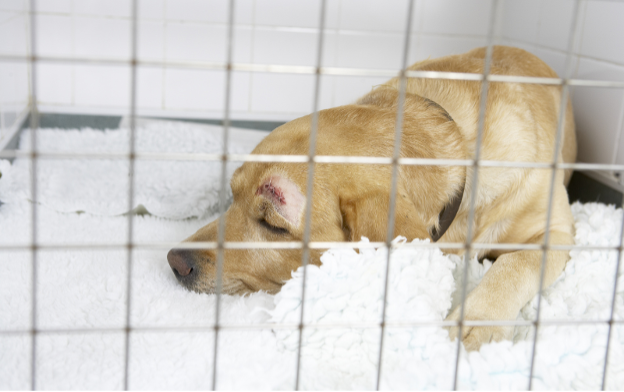Every pet owner fears the moment their pet is hurt or ill. Nothing is more alarming than witnessing our pets in distress. It’s hard to know what to do and to stay calm in the moment. Whether you’re a seasoned pet owner or welcoming a new furry friend into your home, knowing the most common pet emergencies will help prepare you to take action.
In this blog, we go over the most common pet crises, how pet parents can recognize that their pet needs urgent help from a veterinary professional, and how BEVS’ 24/7 Emergency and Critical Care department can help.
Broken Bones & Fractures
Broken bones or fractures are not always immediately obvious unless the bone is visibly out of place or your pet shows signs of pain, lameness, and limb favoring. Fractures and breaks can occur through falls, car accidents, or even during rough play. There are two types of fractures: incomplete and complete.
An incomplete fracture (also known as a hairline fracture) involves the bone cracking but not breaking all the way through. A complete fracture means that the bone has been broken all the way through into two or more separate pieces.
The best course of action in either case is to gently transport your pet to a veterinarian or emergency animal hospital for an evaluation, diagnostics (such as an X-ray), and proper treatment, which may include splinting, casting, or even surgery depending on the severity of the break.
Breathing Issues
Just as in people, breathing problems can occur in pets too. Certain dog breeds, particularly those with brachycephalic (squished face) features (such as Bulldogs, Shih Tzu, Pugs, French Bulldogs, etc.), are more prone to such problems. However, all pets can experience an elevated breathing rate due to various factors like exercise, allergies, foreign objects, heat stress, or underlying lung and heart conditions, among other potential issues.
Symptoms of breathing difficulties in pets may include the following:
- Bluish gums or tongue (lack of oxygen)
- Coughing or sneezing
- Discharge from the nose or eyes
- Excessive panting
- Open-mouth breathing
- Rapid or labored breathing
If you notice signs of respiratory distress and it does not resolve with rest, it is crucial to contact your veterinarian immediately.
Gastrointestinal Issues
Is your pet experiencing vomiting, diarrhea, or both? You may be wondering what is upsetting their stomach. Did they get into something they shouldn’t have? Is there a larger issue at play, like pancreatitis or an infection? Keep an eye on your pet to see if the symptoms resolve by themselves and inspect their vomit and feces for blood and other clues.
If your pet is experiencing these gastrointestinal issues for more than 24 hours, bring them to your primary care veterinarian’s clinic, a pet urgent care, or an animal emergency hospital to receive a diagnosis and treatment from a veterinary professional.
Poisoning
If your pet gets into something they shouldn’t, they run the risk of ingesting something poisonous. Common household toxins include:
- Cleaners and chemicals
- Chocolate
- Fertilizers
- Flowers and plants
- Grapes
- Medications (prescription and over-the-counter)
- Pesticides
- Rodenticides
- Xylitol (also known as birch sugar)
If you have reason to believe your pet ingested a chemical or other potentially harmful substance, give our team a call so we can help. Additionally, The ASPCA Animal Poison Control Center (APCC) is an excellent resource for any animal poison-related emergency. The APCC hotline 888-426-4435 is available 24 hours a day, 365 days a year. Fees may apply.
Trauma or Accident
Accidents can happen in a blink of an eye. These incidents can lead to injuries ranging from bruises and lacerations to more severe damage like broken bones, wounds that need stitches, and even internal trauma. Assess your pet’s condition carefully and contact your local animal emergency hospital to let them know you’re on your way.
Common accidents include:
- Car accidents
- Falls and slipping
- Fights with other animals
- Rough play
- Running into objects
How BEVS Can Help
Our dedicated and highly trained team of emergency veterinarians and technicians is here to help. Our 24-hour facility is equipped with lifesaving technology and supplies needed for managing all types of pet emergencies.
If you believe your pet is having a medical emergency, give us a call at 802-863-2387 so we can provide immediate assistance.

